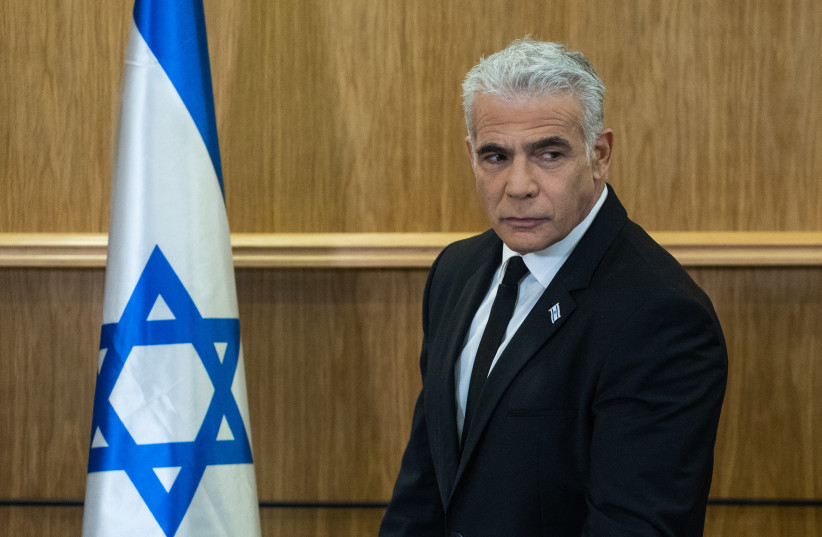For the second straight week, protests will be held across the country on Monday against the government’s judicial reform, as the coalition intends on Monday afternoon to pass the first reading of the overhaul’s first two provisions.
The passing of this initial legislation would give the government control over judicial appointments and allow it to block the High Court of Justice from ruling on Basic Laws.
The protests will include a march for parents and children at 8 a.m.; a one-hour strike beginning at 10 a.m.; and a central protest outside the Knesset beginning at 2 p.m., followed by marches around the Knesset.
Approximately 250,000 people attended protests on Saturday night, according to organizers, marking the seventh straight such mass protests. However, Monday will only be the second time that protests will be held on a weekday, after over 100,000 people protested outside the Knesset and across the country last Monday.
Monday’s vote would mark the coalition’s official rejection of President Isaac Herzog’s plan announced last week, which included a freezing of legislation before the first provisions pass their first reading on the Knesset floor.

The vote is also a significant step forward in the legislative process, as what remains will only be preparation of the bill for its second and third reading, and then to take a vote on both these readings in one sitting in the Knesset plenum.
Lapid purposely bringing Israel to civil war, Smotrich accuses
Finance Minister Bezalel Smotrich said on Sunday at a conference in Jerusalem of municipal authorities from his Religious Zionist Party that opposition leader MK Yair Lapid was not interested in reaching compromise on the reform, and instead was purposely leading the country to civil war, all because he was not willing to accept his loss in the November election.
“I am telling you that the person who is to blame for preventing dialogue on the reform is one person, opposition leader Yair Lapid,” Smotrich said.
"I am telling you that the person who is to blame for preventing dialogue on the reform is one person, opposition leader Yair Lapid."
Bezalel Smotrich
Lapid was “intentionally sabotaging” any attempt at dialogue, Smotrich added, saying that he personally spoke to Herzog and expressed his willingness to immediately begin dialogue, but Lapid had thwarted the initiative.
“Yair Lapid is not interested in broad national consensus. He is not interested in the good of the State of Israel. He is not interested in preventing a schism in the nation. Yair Lapid wants civil war in the country,” the finance minister said.
Smotrich mentioned that many officials from the financial sector were concerned that the economy could be damaged as a result of the reform. This, however, is not a concern that stems from the reform itself, but rather because of the “scare campaign” that Lapid was leading, he added.
“Yair Lapid cares only about Yair Lapid, and narrow and cheap interests are causing him to agitate and create divisions,” said Smotrich.
Smotrich reiterated in his speech that the coalition had no intention to stop the legislative process – and the speech may also have been directed at preempting criticism over its refusal of the president’s proposal.
The finance minister argued that the provisions that would be passed on Monday were simply a codification of the obvious – that High Court judges could not strike down Basic Laws, since their own authority to give rulings stems from those Basic Laws; and that the judicial appointments should cease to be based on what he said were “political deals” and “political bribery.”
He also mentioned that the laws that will pass their first reading also contain a change to the Courts Law, which will require judicial candidates to pass before a public hearing in the Knesset.
Smotrich concluded by calling on citizens to “rise above the propaganda and lies” and learn the details of the reform, which would “strengthen Israeli democracy and strengthen the courts who will deal with individual rights and justice on behalf of the citizens of Israel.”
Leaders of the protests against Smotrich responded in a statement, “It seems that someone is in hysterics and losing his mind. Since Smotrich entered the Finance Ministry, money is fleeing the country, the economy is collapsing, he is missing meetings in order to deal with huts on hilltops. He is trying to incite and tear apart the people even more, instead of repealing the legislation and arriving at broad consensus. The hilltop youth is now trying to ignite not just the Ayalon [Highway], but the entire country.”
Lapid responds: Smotrich, fix the high cost of living
Lapid responded to Smotrich later on Sunday.

"Bezalel, you are no longer a hilltop youth with cans of gasoline. In senior positions it is preferred not to panic so quickly, and not to blame others for the damage that you are causing – not me nor the US administration."
Yair Lapid
Lapid responded to Smotrich later on Sunday.
“Bezalel, you are no longer a hilltop youth with cans of gasoline. In senior positions it is preferred not to panic so quickly, and not to blame others for the damage that you are causing – not me nor the US administration,” the opposition leader said in a video.
“Whoever wants to prevent a civil war does not advance hurried and violent legislation that tears the nation apart. I was the first to propose to hold dialogue at the President’s Residence. Instead of stopping and talking, you are speeding without brakes with crazy legislation that damages the economy, damages security and smashes the people’s unity.
“On your watch, because of your actions, hi-tech is falling apart and money is fleeing Israel. I propose that instead of dealing all day with Yitzhar [a settlement] and with the High Court, do something to rein in the high cost of living because your electorate is also not able to pay its bills,” Lapid said.
Herzog said during a presidential Bible study group session launched by the 929 initiative on Sunday that compromise over the reform could be reached “within days,” if the sides are willing to negotiate.
“During the past week I dedicated myself to meetings and contact with all of the sides of the map and influential bodies in the dispute that stands before us, including leaders in the coalition and opposition, in order to do everything and arrive at dialogue and consensus,” the president said.
“From all of the talks it arose that on the basis of principles I proposed last week, agreements can be reached in a relatively short time, even a few days. Not years or even months,” the president said.
“I determine unequivocally from my experience and role: We can arrive at an agreement,” Herzog concluded.
The comments appeared to be a last-minute attempt to arrive at some kind of basis for dialogue before Monday’s vote.
Herzog’s comments came after the chairman of the Knesset Constitution, Law and Justice Committee, MK Simcha Rothman, one of the reform’s chief engineers, reportedly met with the president and a number of experts on Israel’s judicial system earlier on Sunday afternoon.
Herzog last Sunday laid out a five-point-plan that included formulating a Basic Law: Legislation that would codify the special status and legislative process of basic laws; formulating a plan to deal with the courts’ overburdening, which leads to delays of justice; acting to return trust in the judicial system; reforming the makeup of the judicial appointments committee, but not in a way that gives the government an immediate majority; and define the “reasonableness clause” by negotiation such that it is not canceled completely but also restrains the courts from using it unnecessarily.
